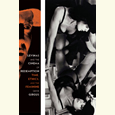Open Secrets and Broken Promises
In David James Poissant’s Lake Life, a family’s farewell to their summer home leads to traumatic reckoning
The vacation home at the center of Lake Life, David James Poissant’s first novel, is cramped and inelegant, a double-wide trailer with a makeshift porch overlooking Lake Christopher in western North Carolina. For decades this unprepossessing structure has been the repository of happy memories for the Starlings — Lisa and Richard, and their sons Michael and Thad. When the parents decide to sell the place, ostensibly to consolidate their assets before retirement in Florida, the family gathers for one final weekend, a last chance to soak up the nostalgic ambiance of rustic relaxation and familial intimacy.

This picturesque plan turns sour from the moment the family sees the state of the lake house. Expecting bucolic charm, they find a shabby, inadequate dwelling gone to seed. No longer a quaint refuge in the woods, the house looks like a dump, signs of desuetude and decay spoiling the Starlings’ recollections of idyllic family summers. The untended lawn hides rusted horseshoes and croquet wickets; the roof leaks; and wasps plague the boathouse. Poissant’s symbolism in these opening scenes is unmistakable: The house represents the Starlings, its derelict condition a correlative of the family’s imminent disintegration.
Poissant gives the Starlings — the nuclear four plus Michael’s wife Diane and Thad’s boyfriend Jake — little time to wallow in this swamp of sadness. Instead, he has them witness a horrific tragedy that accelerates the pace of their personal crises. In the next 48 hours, as buried secrets rise to the surface, each member of the family grapples with some troubling dilemma. Each faces the question: How much of their old identities must they relinquish before they can start building themselves anew?
Poissant’s title quickly becomes ironic, the images it conjures of lazy, sun-soaked days replaced by scenes of simmering resentment. Lisa knows that Richard had an affair but can’t bring herself to confront him. Michael feels betrayed by Diane for allowing herself to get pregnant, despite their pledge never to have children and their borderline-bankrupt financial status. He deals with this problem by getting drunk and provoking strangers into fights. Thad no longer wants his relationship with Jake, a successful Manhattan painter, to be open; but rather than explain his feelings, he gets pulled into a sexual encounter with four participants, a tryst that leaves him feeling more depressed than before.
In other hands, this material could become maudlin, but Poissant manages to intersperse enough comedy and sly insights to keep the pace upbeat and the tone contemplative. When Diane goes swimming at a waterfall, she has no trouble distinguishing locals from tourists. “Men from here wear cutoffs or jean shorts, or drop their pants and swim in their underwear,” Diane observes. “Their tans are real, their Oakleys fake.” The vacationers, by contrast, wear designer shorts that are “plaid or paisley or have Corona emblazoned on the front … Their tans are fake. Their Oakleys are real.”
 Poissant lets readers know the secrets each family member keeps from the others. When the truths begin to leak, Lisa, who harbors the most shocking secret, becomes confused by the problem of selective confidentiality. “It will be hard keeping track of who knows what, who doesn’t, who’s pretending not to know, but this is what it means to be a mother,” Lisa thinks. “Open secrets. Broken promises.”
Poissant lets readers know the secrets each family member keeps from the others. When the truths begin to leak, Lisa, who harbors the most shocking secret, becomes confused by the problem of selective confidentiality. “It will be hard keeping track of who knows what, who doesn’t, who’s pretending not to know, but this is what it means to be a mother,” Lisa thinks. “Open secrets. Broken promises.”
Among the family’s unmentionable problems are Michael’s alcoholism and Thad’s depression. Though loved ones tentatively nudge them toward seeking help, they know that neither Michael nor Thad will change unless their lives blow up. With so much unspoken anxiety and unaddressed trauma, the parents welcome the chance to criticize Michael openly when he confesses to having voted for Trump. Lisa and Richard, who work at Cornell, jump on their wayward son. Poissant, who teaches at the University of Central Florida, demonstrates his artistic impartiality by giving Michael the best lines in this dialogue, including the climactic zinger. “I may be a deplorable, but so are you. All of you. Because guess what? This is America,” Michael says. “Everybody’s somebody’s deplorable.”
Poissant, whose first book was the story collection The Heaven of Animals (2014), is at his best in describing characters’ quiet epiphanies and lacerating self-criticism. Hearing his mother express her love for him, Michael instinctively pulls back, resisting her “emotional manipulation.” Later, though, “he has only to look into his mother’s eyes to know that he is loved.” The love Lisa feels for her broken sons and wayward husband resembles her connection to the crumbling lake house, an affection that does not diminish when she notices its flaws. “This is a summer home, a place for family,” Lisa thinks. “The bathroom fixtures clash, but there’s harmony in the discord.”

Sean Kinch grew up in Austin and attended Stanford. He earned a Ph.D. from the University of Texas. He now teaches English at Montgomery Bell Academy in Nashville.


